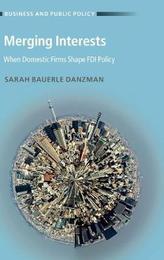
|
Merging Interests: When Domestic Firms Shape FDI Policy
Hardback
Main Details
| Title |
Merging Interests: When Domestic Firms Shape FDI Policy
|
| Authors and Contributors |
By (author) Sarah Bauerle Danzman
|
| Series | Business and Public Policy |
|---|
| Physical Properties |
| Format:Hardback | | Pages:348 | | Dimensions(mm): Height 235,Width 155 |
|
| Category/Genre | International economics
Political economy
International business |
|---|
| ISBN/Barcode |
9781108494144
|
| Classifications | Dewey:332.67320954 |
|---|
| Audience | | Professional & Vocational | |
|---|
| Illustrations |
Worked examples or Exercises
|
|
Publishing Details |
| Publisher |
Cambridge University Press
|
| Imprint |
Cambridge University Press
|
| Publication Date |
19 December 2019 |
| Publication Country |
United Kingdom
|
Description
Why do governments open their economies to multinational enterprises (MNEs)? Some argue democratic forces promote this openness, but many citizen groups view multinational business with suspicion. Using quantitative and qualitative analysis, Bauerle Danzman demonstrates how large domestic firms push to liberalize foreign direct investment (FDI) policies to ameliorate financing constraints, often to the detriment of smaller competitors. MNE entry comes with substantial risks, such as higher labour costs and increased productivity pressures, so well-connected domestic firms will prefer to limit access to local markets when the costs of debt financing are relatively low. However, when local environments make debt financing increasingly expensive, firms will be more willing to dismantle restrictive investment policies so that they may overcome liquidity constraints with equity financing from abroad. Bauerle Danzman includes comparative analysis of Malaysia and Indonesia from 1965-2016 to illustrate how governments undertake investment policy reform, and to indicate the interest groups that influence the outcomes of these regulatory changes.
Author Biography
Sarah Bauerle Danzman is an assistant professor of International Studies at Indiana University. She is also a 2019-20 Council of Foreign Relations International Affairs Fellow (working in US government to study the inter-agency foreign investment screening process). She has published in various outlets including International Relations Quarterly and Perspectives on Politics, and consults regularly with the World Association of Investment Promotion Agencies and the World Bank Group on investment promotion policy.
Reviews'It is perhaps a truism that countries, firms, and individuals seek to increase their access to capital. Capital market liberalization, the opening of markets to inflows and outflows of capital, has long been seen as a net positive for the local and global economy. However not all countries and industries are equally willing and able to liberalize. Sarah Bauerle Danzman makes an important contribution to our understanding of these dynamics through the development of an argument that gives pride of place to the economic and political preferences of interest groups, politicians, and firms. The theoretical argument in this book is masterful and the evidence is more than compelling. Merging Interests is a must read for anyone who is serious about understanding the global political economy.' David Leblang, University of Virginia 'Bauerle Danzman's carefully researched book reminds us that domestic firms require capital, and if they cannot obtain it domestically, they will seek foreign sources. Capital-constrained domestic firms are therefore the leading advocates for foreign direct investment liberalization in many developing countries. The book, with its mix of quantitative tests and country case studies, is a welcome contribution to a literature that often overlooks the dynamics of banking and capital markets.' David A. Singer, Massachusetts Institute of Technology 'This book on the politics of foreign direct investment restrictions will be a seminal work in the field. Challenging the conventional wisdom, Professor Danzman advances an original theory of when local capital supports the liberalization of foreign investment laws. Using cross-national statistical analysis as well as carefully selected case studies, Professor Danzman provides strong evidence supporting her new and compelling theory.' Nathan Jensen, University of Texas, Austin, author of Incentives to Pander 'Sarah Bauerle Danzman deftly navigates the complexities of corporate finance to explain why large domestic firms, typically wary of FDI, welcome these investments when they lose preferential access to capital. In contrast to labor-centric accounts of FDI liberalization, she anchors the political economy of FDI policy to broader macroeconomic conditions that make firms support greater FDI openness. Her account offers valuable new insights on the politics of FDI regulation, and on how firms adapt to global economic integration.' Sonal S. Pandya, University of Virginia
|